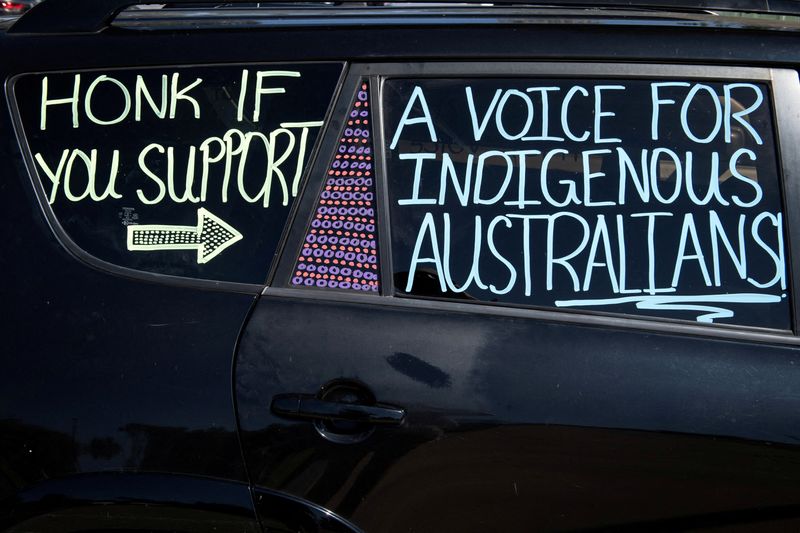By Byron Kaye
SYDNEY (Reuters) - Australia is scheduled to hold a referendum on Oct. 14 to decide whether to create a constitutionally enshrined Indigenous advisory body to parliament, as requested by the country's Indigenous leaders in 2017.
Since the referendum concerns a change to Australia's constitution and is unrelated to party politics - officially, anyway - the campaigns for and against the proposal are decentralised.
The 'No' campaign, especially, involves groups and individuals from across the political spectrum, from those who say the advisory body would be too powerful to those who think it would not be powerful enough.
The referendum asks voters to give only 'Yes' or 'No' responses to the proposed change, so the 'No' camp is not required to put forward an alternative form of Indigenous representation. To succeed, it must only convince voters not to support the current proposal.
Australia's Indigenous citizens, about 3.8% of the country's 26 million population, have inhabited the land for about 60,000 years but are not mentioned in the constitution and track below national averages on most socio-economic measures.
These are the main groups who oppose establishing the so-called Indigenous Voice to Parliament:
*The Liberal-National Opposition: Australia's conservative-leading Liberal and National parties have a longstanding coalition and each have campaigned against the Voice on the grounds that it would divide the country by race. Some senior party figures have still said they support the Voice, including Liberal Tasmanian state Premier Jeremy Rockliff and former Liberal foreign minister Julie Bishop.
*Advance Australia: The conservative lobby group has positioned itself as a counterweight to left-leaning advocacy groups in recent elections, with campaigns fought mostly on social media. Advance Australia also operates Facebook (NASDAQ:META) discussion groups to amplify anti-Voice content. Indigenous conservative senator Jacinta Nampijinpa Price has supported Advance Australia's campaign.
*Right-Wing Populists: Some populist political parties, including Pauline Hanson's One Nation, which has two of Australia's 76 Senate seats, have said they oppose the Voice because of concerns it would give additional powers to Indigenous leaders. Hanson, who has nearly 500,000 Facebook followers, has made unsubstantiated claims about the Voice including that it would lead to a breakaway Aboriginal state. The sole senator for mining billionaire Clive Palmer's "Palmer United Party" has called the voice "racist".
*Treaty Advocates: Some Indigenous leaders oppose the Voice because they say it compromises on their aim of achieving a treaty to end an occupation war which began with European arrival in 1788. Warren Mundine, a former Labor party president, who is Indigenous, has campaigned against the Voice saying that a 'No' result would improve the chances of a treaty. Senator Lidia Thorpe, who is Indigenous, quit the left-wing Greens party to become independent in February because of its support for the Voice, saying the party held back her advocacy for the "Black Sovereign Movement".
